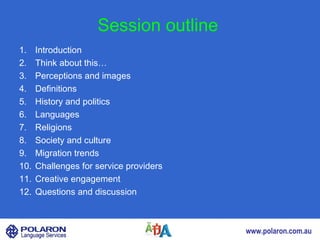
Creative Engagement with Arabic Speaking Communities
- 1. Session outline 1. Introduction 2. Think about this… 3. Perceptions and images 4. Definitions 5. History and politics 6. Languages 7. Religions 8. Society and culture 9. Migration trends 10. Challenges for service providers 11. Creative engagement 12. Questions and discussion www.polaron.com.au
- 2. Introduction 1. Workshop born out of frequent confusion and common misconceptions 2. Polaron: extensive experience in translation, training and interpreting 3. Facilitator: experience in interpreting, broad linguistic and cultural knowledge, experience in Australian context www.polaron.com.au
- 3. Think about this… When I’m old: • Halal food • Arabic interpreter • Arabic music Creative engagement in practice www.polaron.com.au
- 4. Perceptions „ All Arabs are Muslims.” „ All Arab Muslims are fanatic and have extremist views.” „ Arabs are unfriendly, lazy and don’t know how to take a joke.” „ Most Arabs are uneducated and illiterate.” „ Arab women are opressed and mistreated by males”. „ Arabs don’t integrate well and don’t contribute to the society.” www.polaron.com.au
- 5. Reality „Not all Arabs are Muslims.” „Most Arab Muslims are moderate in their beliefs and views towards other religions and cultures”. „Arabs are hard working and have a great sense of humour.” „Most Arabs are literate and many have university degrees.” „Women have equal rights to education and employment - legislation exists that prohibits violence against women.” “Arabs are social and they like to integrate with the surrounding community. They like to support their community members.” www.polaron.com.au
- 6. Arabs in the media www.polaron.com.au
- 7. Arabs in the media www.polaron.com.au
- 8. Social media www.polaron.com.au
- 9. Arabs in their own eyes www.polaron.com.au
- 10. Definitions 1. What is the Middle East? 2. Countries in the Middle East: Bahrain, Egypt, Iran, Iraq, Israel, Jordan, Kuwait, Lebanon, Oman, Palestinian territories. Qatar, Saudi Arabia, Syria, Turkey, United Arab Emirates and Yemen www.polaron.com.au
- 11. Middle East www.polaron.com.au
- 12. History and politics 1. Before Islam 2. Islamic Empire (632 – 1517) 3. Ottoman colonialism era (1516 – 1918) 4. European colonialism era (1916 – 1970) 5. Totalitarian regimes 6. The Arab spring of December 2010 www.polaron.com.au
- 13. Languages 1. Arabic language • Most widely spoken language in the region • 28 letters = 28 sounds • Synthetic language • Standard Arabic and classical Arabic • Regional varieties of Arabic 2. Arabic numbering system 3. Other languages of the region: Persian, Turkish, Hebrew, Kurdish, Aramaic www.polaron.com.au
- 14. Religions 1. Islam • The main religion • Friday • Muslim prayers • Fasting • 3 annual festivals • Haj (pilgrimage to Mecca) • Annual march to Karbala • Taboos: pork, porn, alcohol, non-halal food 2. Other religions of the region: Judaism, Christianity, Baha’i, Druze, Yazidi, Mandaeanism, Gnosticism, Shabakism www.polaron.com.au
- 15. Society and culture • Conservatism • Collectivism • Masculinity • High-context culture • Hierarchical roles • Polychronic time • Hospitality www.polaron.com.au
- 16. Migration trends • Facts and numbers • Wars and hardship • First wave of migration (1870s) • Recent waves • Motivation • Views towards Australia • Maintaining culture and contact with home countries www.polaron.com.au
- 17. Challenges for service providers • Communication difficulties • Different socio-cultural systems • Communication across gender • Interpreting and translating • Finding the right interpreter • Illiteracy www.polaron.com.au
- 18. Challenges for service providers • Past experiences • Fear of authority • Lack of trust • System differences – mental health, disability, age care, no efficient social security system • Acculturation www.polaron.com.au
- 19. Creative engagement • Linking the new arrivals with their existing communities: comfort, confidence, reliability and extra support. • Volunteers or social workers from the same community. • Establishing friendship with the client first. • Use standard Arabic for all translations. • Hiring interpreters with the same language variety. • It is desirable to use an interpreter of the same sex. • Service providers need to adjust their language to meet the client’s comprehension. www.polaron.com.au
- 20. Creative engagement • Simplify the message by referring to common elements. • Use culturally appropriate body language. • Raise your awareness of cultural norms, values and beliefs of the community by gaining knowledge. • Notice the client’s cultural norms of interaction. • Face-to-face interaction is more effective. • Reduce the impact of past experiences through engaging clients in some interesting activities. • Avoid authoritative aspects: voice tone, body language. www.polaron.com.au
- 21. Creative engagement • Comparative approach to raise your client’s awareness of the differences in the social services in Australia. • Be patient with clients. Try to reassure them and address their concerns. www.polaron.com.au
- 22. Questions and comments www.polaron.com.au